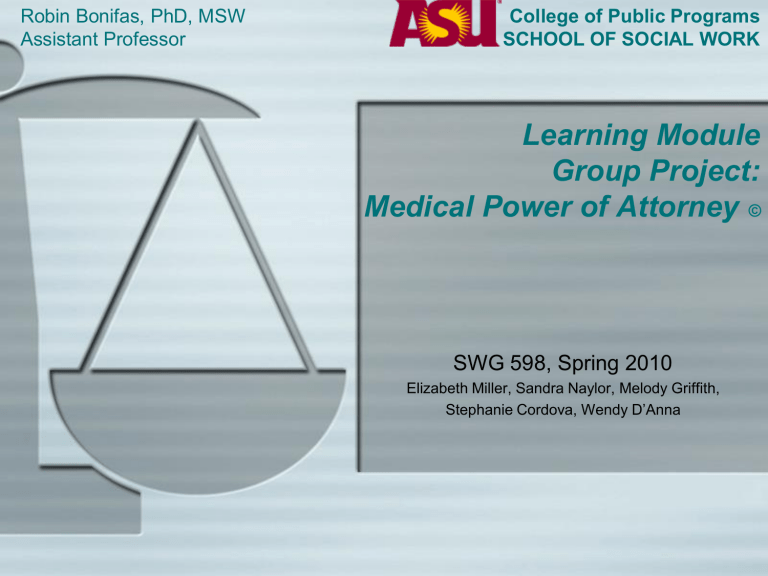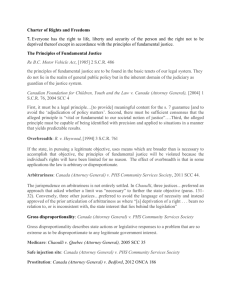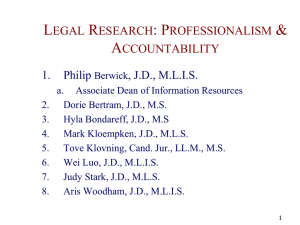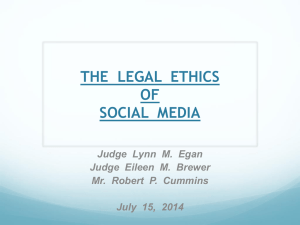Medical Power of Attorney: Learning Module Group Project

Robin Bonifas, PhD, MSW
Assistant Professor
College of Public Programs
SCHOOL OF SOCIAL WORK
Learning Module
Group Project:
Medical Power of Attorney
©
SWG 598, Spring 2010
Elizabeth Miller, Sandra Naylor, Melody Griffith,
Stephanie Cordova, Wendy D’Anna
Medical Power of Attorney
Definition
Designation of a surrogate decision-maker (3) for “any future period of mental incapacity”.
(8)
Establishes a “health care proxy” for the patient.
(9)
Designated person uses a substituted judgment, or best interest, standard.
(9)
Purpose
Medical power of attorney is a type of “advance directive”
Allows a patient to make determinations about their care prior to it being necessary.
Living will is another common advance directive.
Impact on Older Adults
U.S. has a growing population of older adults and more people will be facing end-of-life decisions.
(3)
Older adults with decreased cognitive functioning are less likely to complete medical power of attorney.
(3)
Population of older adults with decreased cognitive functioning is expected to increase proportionately with general growth of this group.
(3)
Social workers are “major contributors to quality patient care” for older adults.
(1)
Knowledge and experience with policy mandates are essential.
Assessment
Advantages of medical power of attorney:
Enhanced patient empowerment (9)
Patient is assured their specific wishes will be carried out by the specific person they designate.
(8)
Medical power of attorney formalizes a role that loved ones are likely already playing.
(3)
Fewer detailed decisions need to be made by the patient in advance. (3)
Relatively simple process with basic paperwork and typically little confusion.
(3)
Potentially reduces confusion and expended resources.
(8)
Assessment (con’t.)
Social workers are vital to interdisciplinary treatments.
(1)
Health care social workers, trained in bio-psycho-social aspects (1) , are one of the best resources for a patient contemplating end-of-life-decisions.
Research indicates that social workers have “high to moderate” awareness about medical power of attorney and hold positive attitudes about it.
(1)
It is common for the patient and family to discuss their options with a social worker.
(1)
Assessment (con’t.)
Culture plays a role in advance directives:
Similarities among patients can reflect a “common American core culture”, including:
» Dying patients deserve a say in their care.
» Advance directives serve that role.
(6)
Differences can represent unique ethnic cultures, including:
» The health care system controls the process.
(6)
» Advance planning is unnecessary.
(6)
GOAL: A well-structured advance care plan especially including medical power of attorney information needs to be specifically tailored to the individual’s needs.
Intervention Strategies
Mental status testing
Clinical interviews allow for an interpretation of patient’s cognitive functioning.
(10)
Typically used to assess delirium and schizophrenia. (10)
Should be conducted prior to any assistance with medical power of attorney
Mini-Mental State Exam (MMSE)
Created in 1975 by Folstein and is the most widely used test (10)
Includes clear scoring system and cut-off levels.
(10)
Standardization allows for relatively quick and usable results.
(10)
A copy of the exam is available: here
However, some suggest that individuals with lower levels of education might be classified as impaired if their total score is not adjusted for educational level.
(5)
Therefore, the least complicated use of these results is to locate an individual’s
MMSE score within the percentile distribution shown for that person’s age and educational level.
(2)
Intervention Strategies (con’t.)
Communication between patient and social worker:
Accurately convey relevant information to patients.
Educate patient and family whenever opportunity arises.
(1)
Facilitate open discussion.
(1)
Awareness of social worker:
Social workers with more experience working with older adults have higher knowledge of medical power of attorney policy.
(1)
Hospice and nursing home social workers have the most positive attitudes about medical power of attorney.
(1)
Structure planning sessions in accordance with “the patient’s specific ethnic views”.
(6)
Intervention Strategies (con’t.)
Training and education for health care social workers:
Small group workshops, role-playing and structured planning discussions make a significant difference in patient attitudes towards medical power of attorney.
(4)
Simple alternatives to the conventional process:
Mailing informational pamphlets significantly increases patients’ completion of medical power of attorney.
(7)
Some patients may prefer a living will:
Often a more detail-oriented advance directive (8)
Many complications and complexities exist that are not present in medical power of attorney.
(8)
Conclusions
Some keys to remember:
Informed discussion for end-of-life decisions is essential.
Appreciate and respect cultural differences to create a customized process for the patient.
Necessary skills:
Experience working with older adults
Relevant training ensures patients are satisfied with their end-of-life decision-making process.
(4)
A positive attitude
Accurate knowledge
Awareness of limitations in a patient’s medical power of attorney to ensure proper compliance.
References
1) Baker, M.E. (2001). Knowledge and attitudes of health care social workers regarding advance directives.
Social Work in Health Care, 32 (2), 61-74.
2) Crum, R.M., Anthony, J.C., Bassett, S.S., & Folstein, M.F. Population-Based Norms for the Mini-Mental
State Examination by Age and Educational Level. JAMA : the journal of the American Medical Association,
269( 18), 2386-2391.
3) McGuire, L.C., Rao, J.K., Anderson, L.A., Ford, E.S. (2007). Completion of a durable power of attorney for healthcare: What does cognition have to do with it? The Gerontologist, 47 (4), 457-467.
4) Morrison, R.S., Chichin, E., Carter, J., Burack, O., Lantz, M., Meier, D.E.(2005). The effect of a social work intervention to enhance advance care planning documentation in the nursing home. Journal of the American
Geriatric Society, 53 (2), 290-294.
5) Mungas, D., Marshall, S. C., Weldon, M., Haan, M., & Reed, B. (1996). Age and educational correction of
Mini Mental State Examination for English and Spanish speaking elderly. Neurology, 46, 700–706.
6) Perkins, H.S., Geppert, C., Gonzales, A., Cortez, J.D., Hazuda, H. (2002). Cross-cultural similarities and differences in attitudes about advance care planning. Journal of General Internal Medicine, 17 (1), 48-57.
7) Rubin, S.H., Strull, W.M., Fialkow, M.F., Weiss, S.J, Lo, B. (1994). Increasing the completion of the durable power of attorney for health care: A randomized, controlled trial. JAMA, 271 (3), 209-212.
References, continued
8) Spears, R., Drinka, P.J., Voeks, S.K. (1993). Obtaining a durable power of attorney for health care from nursing home residents. Journal of Family Practice, 36 (4), 409-413.
9) Srebnik, D.S., La Fond, J.Q. (1999). Advance directives for mental health treatment. Psychiatric
Services, 50 (7), 919-925.
10) Zarit, S.H., Zarit, J.M. (2007). Mental disorders in older adults.
New York: Guilford Press.











